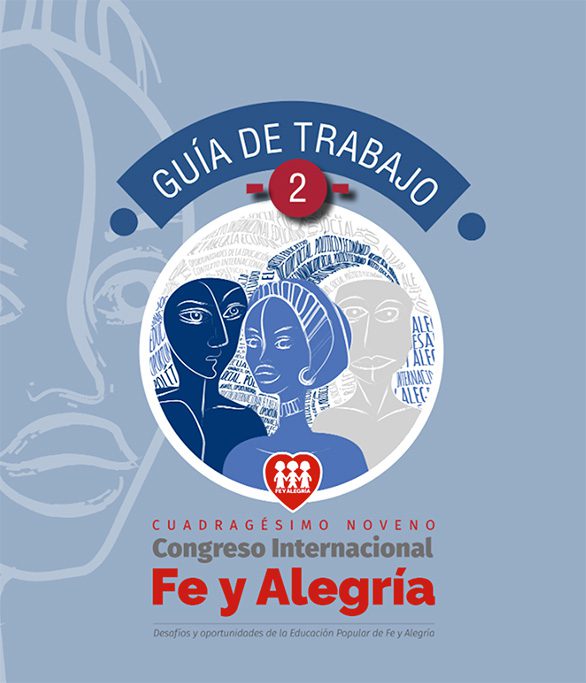Transformative pedagogies and their concreteness in
Fe y Alegría
This roundtable established Regional Pedagogical Dialogue Circles with 133 educators from Latin America, Europe and Africa. Twenty-two innovative pedagogical practices were presented that address seven challenges to improve the quality of education in vulnerable populations. These practices reflect Fe y Alegría’s commitment to equitable, inclusive and quality education, integrating the community and prioritizing the continuous training of educators.
Work Guide
The document analyzes the challenges and opportunities of Fe y Alegría’s popular education in the current context, highlighting the importance of a transformative pedagogy that involves critical learning and social empowerment. It discusses how the congress will advance reflection on educational and pedagogical practices, with special emphasis on educational rights and pedagogical quality in vulnerable contexts. It also mentions the preparation for the international congress and the work phases that have been developed.
The guide highlights:
-
- Transformative pedagogy.
- Educational rights.
- Pedagogical quality.
Worktable results
The document consolidates Fe y Alegría’s pedagogical challenges, addressed in dialogue circles in Latin America, Africa and Europe. It examines the recovery of learning, educational quality, inclusion, personal, social and environmental care, with emphasis on life projects, intercultural literacy, job training, identity in early childhood, education for global citizenship, leadership and management. It also addresses ecological challenges, sustainability, internal and regional networks, pedagogical training, use of technology and innovation in educational practices.
Learn about some pedagogical practices
Venezuela
Caños de Tucupita
Since 2000, Fe y Alegría Tucupita has developed an educational project focused on intercultural bilingual literacy for youth and adults, especially in the Warao indigenous community of the Orinoco Delta. With more than 24 years of experience, it has taught more than 9,000 people to read and write. The program, which integrates the Warao language and Spanish, faces logistical and cultural challenges, but has managed to improve self-esteem and recognition of rights in the communities. Fe y Alegría continues to expand its reach.
Guatemala
Fe y Alegría Guatemala
At the Centro Educativo Fe y Alegría 2 in Colonia Carolingia, zone 6 of Mixco, Guatemala, students and mothers are immersed in a unique learning experience through the school garden. In this pedagogical practice, participants not only grow vegetables and herbs, but also fundamental life skills. As they plant and care for the plants, they develop hard skills such as knowledge about sustainable agriculture and cultivation techniques, as well as soft skills such as teamwork, responsibility and environmental awareness. The school garden thus becomes an integral learning space that fosters a connection with the land, the community and the importance of healthy eating, while reinforcing a sense of belonging and cooperation among members of the educational community.
Peru
Fe y Alegría 45
Fe y Alegría Peru’s pedagogical practice “Strengthening our autonomy to achieve full citizenship” in Arequipa involves high school adolescents in activities that promote autonomy and leadership. Through student assemblies and collaboration with community leaders, students develop critical thinking skills and active participation, addressing social problems and contributing to the transformation of their environment. This initiative strengthens their role as citizens committed to the common good.
Photo Gallery
Fe y Alegría Honduras
Fe y Alegría Democratic Republic of the Congo
Fe y Alegría Democratic Republic of the Congo
Fe y Alegría Guatemala
Receive all news and updates
Sign up to receive exclusive information, the complete agenda, and special event announcements.
Be part of the change!
Fe y Alegría El Salvador
